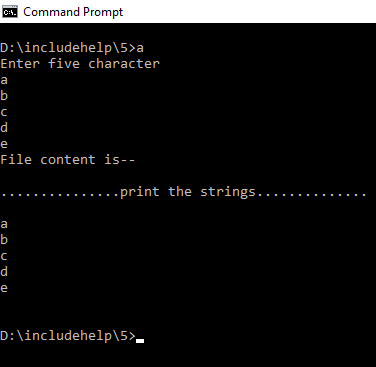Home »
C programs »
C stdio.h library functions programs
fputc() function in C language with Example
Here, we are going to learn about the fputc() function of library header stdio.h in C language with its syntax, example.
Submitted by Souvik Saha, on January 09, 2019
fputc() function in C
Prototype:
int fputc(const char ch, FILE *filename);
Parameters:
const char ch, FILE *filename
Return type: int
Use of function:
In the file handling, through the fputc() function we take the next character from the input stream buffer and put the characters in the file and increments the file pointer by one. The prototype of the function fputc() is: int fputc(const char ch, FILE *filename);
Here it put the characters into the specified files and filename is the name of file stream.
fputc() example in C
#include <stdio.h>
#include <stdlib.h>
int main()
{
//Initialize the file pointer
FILE* f;
char ch;
//Create the file for write operation
f = fopen("includehelp.txt", "w");
printf("Enter five character\n");
for (int i = 0; i < 5; i++) {
//take the characters from the users
scanf("%c", &ch);
//write back to the file
fputc(ch, f);
//clear the stdin stream buffer
fflush(stdin);
}
//close the file after write operation is over
fclose(f);
//open a file
f = fopen("includehelp.txt", "r");
printf("\n...............print the characters..............\n\n");
while (!feof(f)) {
//takes the characters in the character array
ch = fgetc(f);
//and print the characters
printf("%c\n", ch);
}
fclose(f);
return 0;
}
Output

C stdio.h Library Functions Programs »
Advertisement
Advertisement